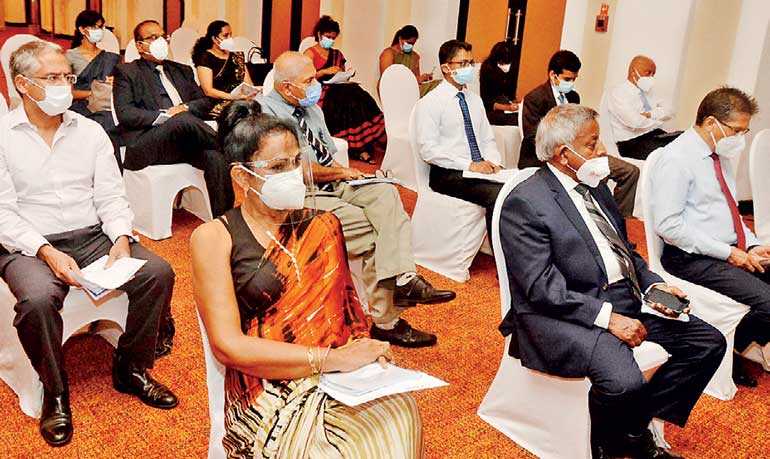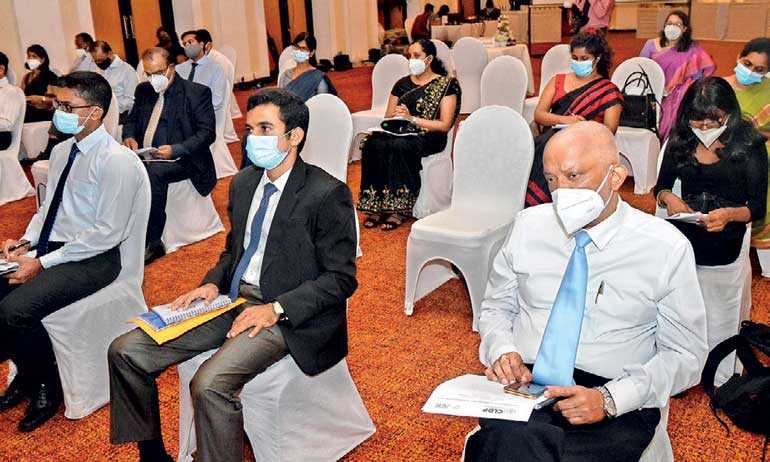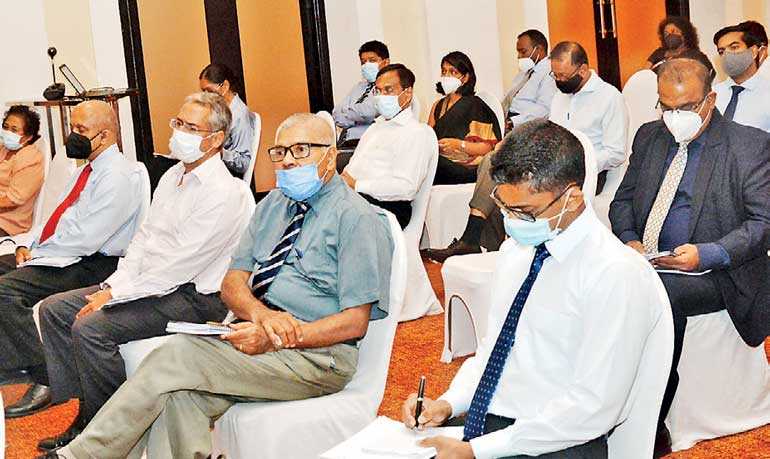Thursday Feb 19, 2026
Thursday Feb 19, 2026
Tuesday, 27 April 2021 00:29 - - {{hitsCtrl.values.hits}}

CCC/ICLP ADR Centre Director Dhara Wijayatilake

CCC/ICLP ADR Centre Director Dr. Harsha Cabral PC
By Franklyn Amerasinghe
The ADR Centre initiated by the Ceylon Chamber of Commerce and the Institute for the Development of Commercial Law and Practice will provide a new system of commercial arbitration and mediation in terms of the rules which were launched on 22 April.
The Centre is grateful for the support of the Commercial Law and Development Program (US Dept. of Commerce) which has been supporting it from its incorporation.
I will not deal with the arbitration services which will probably be the subject of a separate article, but I might mention that the new rules will strive to rid itself of the current systemic drawbacks which have stunted the growth of arbitration as an efficient dispute settlement mechanism.
Mediation we associate with the process which is available under the Mediation Act as amended and which is responsible for handling specified disputes in areas where such Boards exist. There is nothing to prevent others whose disputes are unspecified to also seek the assistance of these Boards but there is a lack of interest in such Boards since the personnel dealing with mediations do not have the appropriate facilities and are not usually technically capable of assisting parties to find solutions to commercial disputes of a complex nature.
The ADR Centre and its Secretary General Dhara Wijayatilake are working on a possible piece of legislation to give teeth to the process of mediation and also create a venue for international mediations now that Sri Lanka has ratified the UN Convention on Mediation.
The ADR Centre commenced the process of training mediators using local and international experts more than two years ago and the accreditation of mediators is ongoing. The concept of mediation is not new to Sri Lanka and in ancient times we had, at several levels, the possibility of elders and persons in authority who attempted to bring about the resolution of disputes by persuasion rather than by decree. The problem with Court decisions or even Arbitral Awards is that the final solution is a ‘win-lose’ or even a ‘lose-lose’ situation for the parties.
Why ‘lose-lose’? Because at the end of the day, maybe due to the long period taken by the process the decision cannot make up for the loss of revenue, business or clients lost in the meantime, or the loss of a relationship or image which may not be so transparent and measurable but real. The traditional mediation by elders has much for us to learn from. In a commercial transaction if the parties see a social need to resolve their differences for mutual benefit and the maintenance of a social equilibrium, then mediation is the best process for them!
Mediation is a voluntary process through and through and its attraction is that it recognises that the parties are responsible and credible; that they are practical and intelligent enough to work out the cost of conflict; and further, and foremost, that they can maintain, and build a relationship, with business partners.
What are the situations when mediation would be preferable to litigation, arbitration or adjudication? Firstly, when the parties need a quick solution which preserves the contract entered into and promotes the continuance of the contract that has commenced. This could also mean that a contract could initially select a mediator to deal with a contingent dispute which may arise, and which can be isolated from the main contract and resolved without interfering with the flow of the main contract.
For example, it may be a dispute regarding one item of the contract which is of little significance such as the quality of the grass for the garden when the contract is for the commissioning of a condominium. Separating an irritant could help to prevent the main construction from being stalled! Often the dispute arises due to the personalities representing the parties and the emotional restraint a mediator brings to the table could overcome such unnecessary distractions from the interests of parties.
Some of the common types of dispute which could be referred are a breach of contract by one party – In relation to a timeline fixed: The quality of a material or final product: Financial capacity to complete a project: Changes in requirements due to market needs: Collapse of a business: Unclear provisions of the contract. These are all situations where a third party who is skilled could bring about a settlement by moving the parties from their positions to an understanding of their actual interests and how they could be best served in the circumstances.
The dispute could also be in relation to a damaged relationship such as statements of a defamatory nature made in the heat of a moment, or damages physically suffered by an accident. Maritime accidents and damages in running down cases are also capable of mediation to the satisfaction of parties. The dispute could also be about patents and copyrights. This is obviously not an exhaustive list. The areas covered by the ADR Centre does not exclude the plethora of employment disputes which we experience, as they have a commercial value.
The mediator apart from possessing problem solving skills would need to be an individual with great patience, credibility, capable of empathy and powers of persuasion. Mediators will be selected and trained to meet these requirements.
It must be remembered that the parties are entitled to withdraw from the process at any time or change the mediator/s if they feel uncomfortable with the process. The mediator has the challenge of balancing the interest of the parties in an impartial manner and moving the dialogue forward towards a settlement. We often use the word ‘dialogue’ loosely, and what the process envisages is a true effort on both sides, facilitated by the mediator, to understand each other’s needs in achieving a settlement. This requires an ability to be creative in identifying options which would work in the circumstances.
The bottom line is that mediation is a means of businesses maintaining their credibility as reliable partners and showing their openness to sensible business dealings. I would go to the extent of suggesting to the Centre that they have a list of businesses who are registered as members of the ADR Centre which would give them a brand as being responsible corporate citizens when they negotiate a deal.
(The writer is an Arbitration Board Member. Former member of the Joint Panel for Dispute Resolution in the ILO, author of the Manual for Mediators, and ITC/ILO Training material on Conflict Management.)
Pix by Upul Abayasekara


